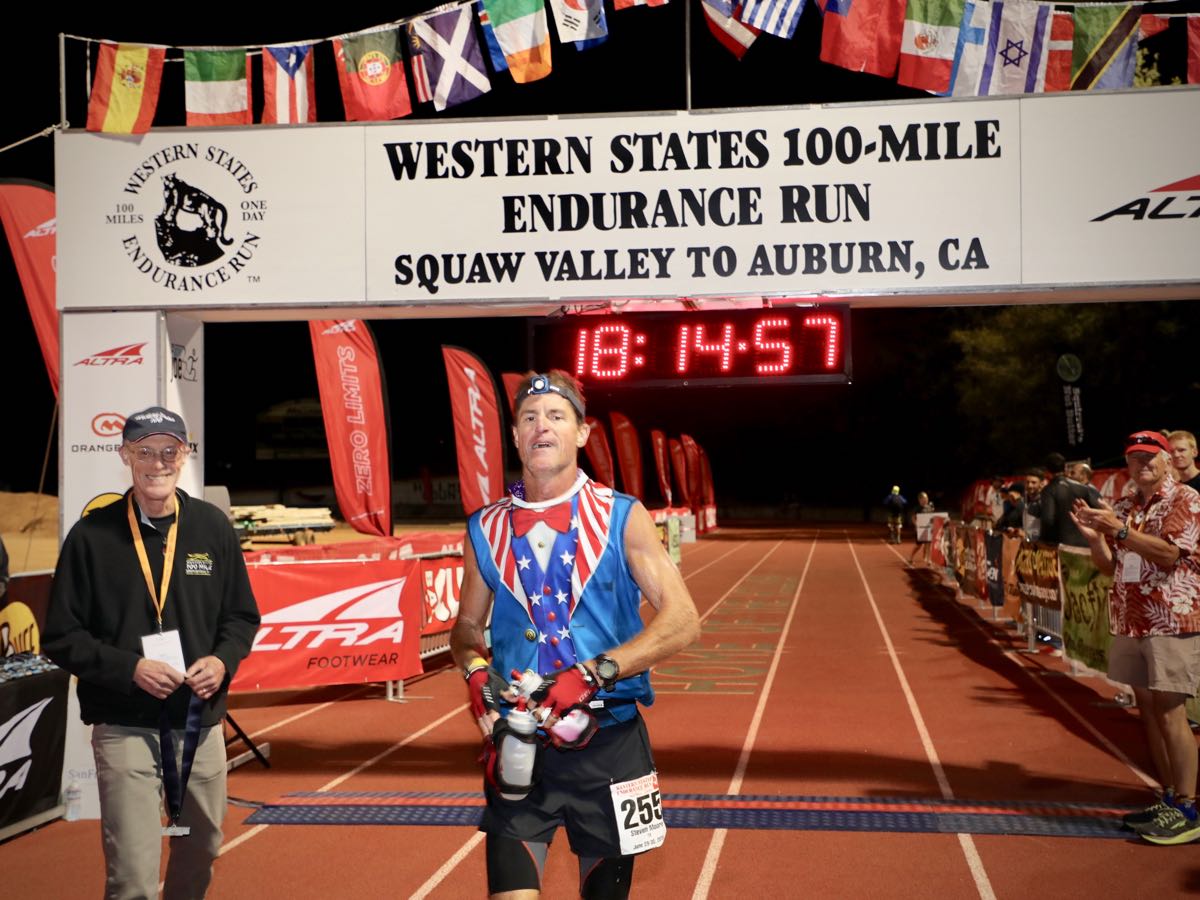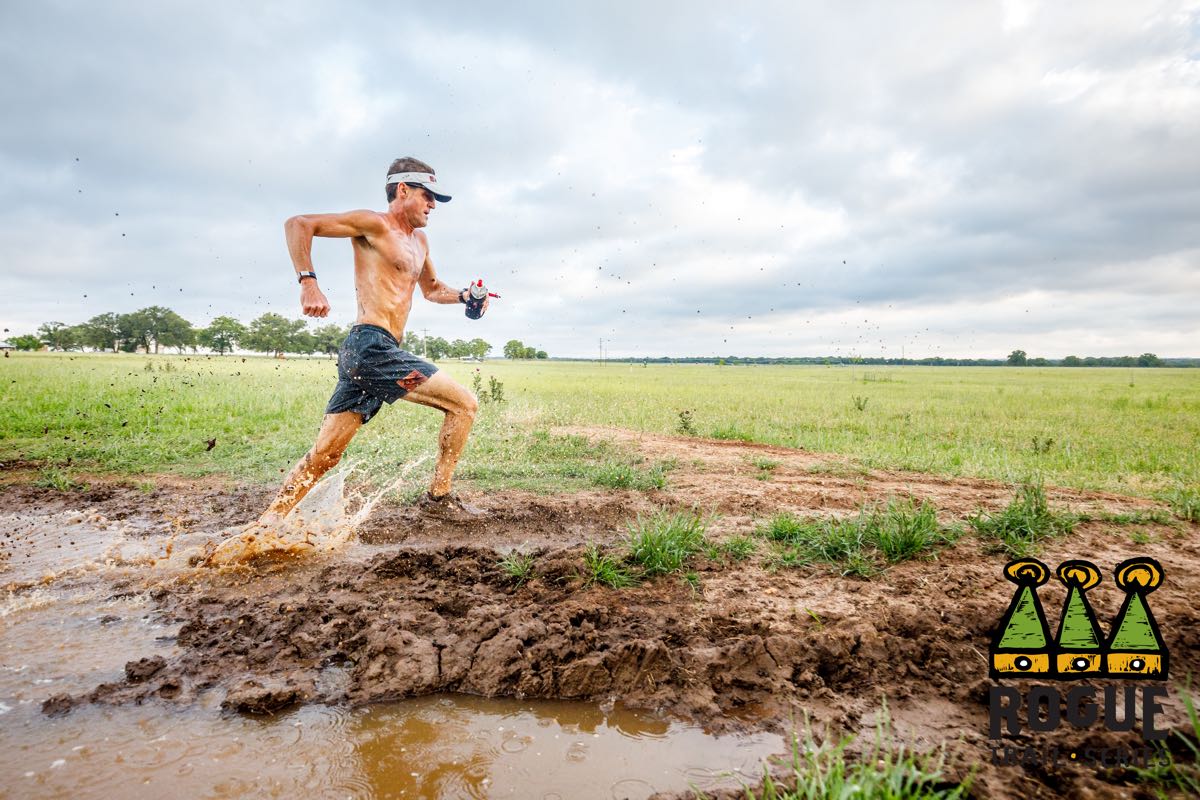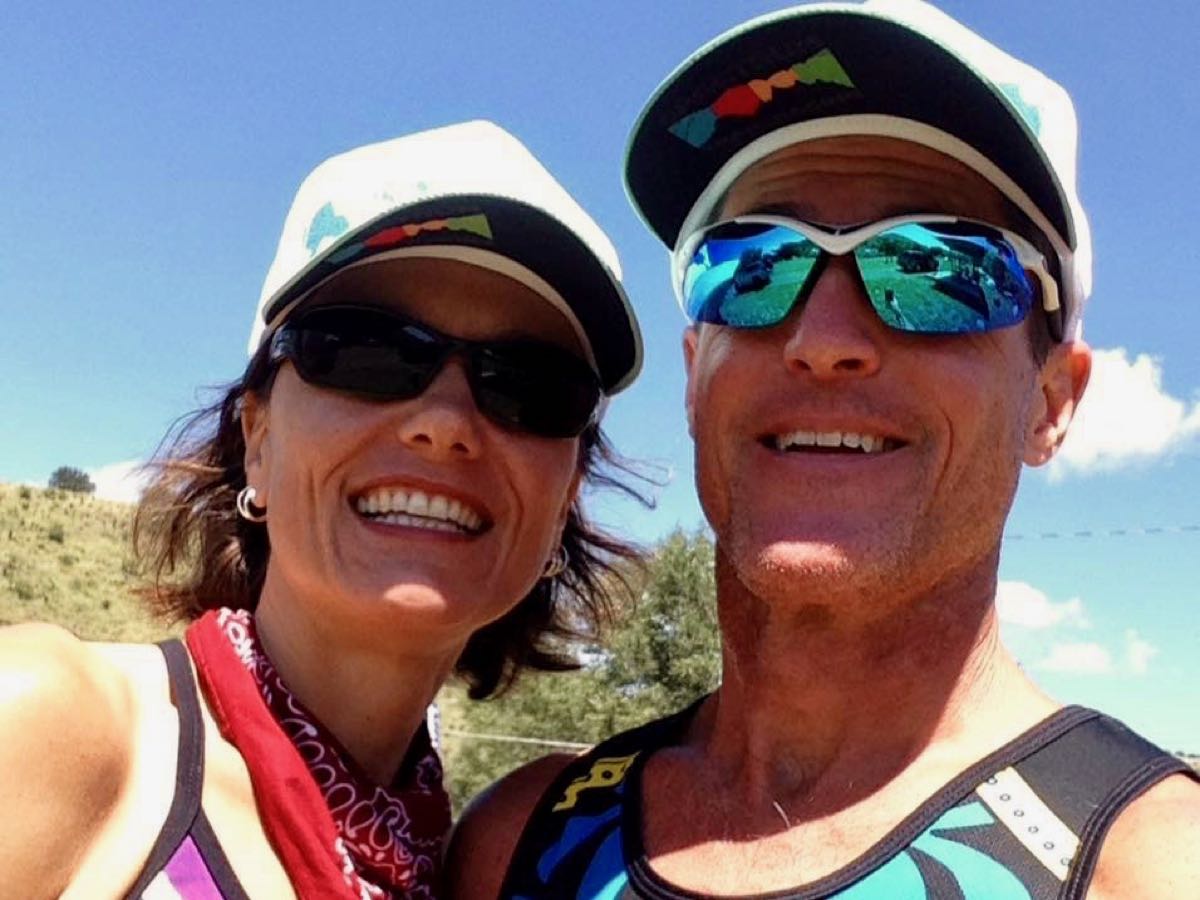‘Age-Old Runners’ is an article series where we explore runners’ performance potential after the age of 45 by interviewing excellent middle-aged runners. Is there still potential to improve? What roles do motivation, mindset, and specific training and recovery techniques play in allowing runners in their mid-40s to mid-60s to continue to excel? To learn more about this series’ goals, check out its introductory article.
Steven Moore is a 52-year-old trail runner in Austin, Texas. Since turning 45, he’s won the Superior Falls 100 Mile, Cactus Rose 100 Mile, Mogollon Monster 100 Mile, and finished second at the Arkansas Traveller 100 Mile twice. He’s been in the top five at most of the 64 ultramarathons he’s run since starting back in 2008. And in 2019, at his first Western States 100, Steven broke Doug Latimer’s longstanding 50-to-59 age-group record, running 18:14:57 and finishing 18th overall.
The following is a transcript of a phone interview with Steven. It has been edited for brevity and clarity.
When did you start running?
I guess I started running in the late 1970s. Or back then, it was actually called jogging. I played soccer in elementary school, and my dad didn’t know anything about soccer. He got roped into being an assistant coach… and he was already into jogging for cardiovascular health with the whole Jim Fixx and Bill Rodgers books. So he said, “Well, if I’ve got anything to do with this, you guys are going to be in better shape than you are now.” So I was jogging with my dad in the late ’70s. But I certainly didn’t start entering a bunch of races or anything.
When I came to college in 1985, I joined the lacrosse team at UT [the University of Texas at Austin.] That was quite a bit of running, and during the off season I stumbled into the Austin Hash House Harriers. They call themselves a drinking club with a running problem. That was right up my alley. I began running the hash for about 10 years from 1987 to 1997. Those events weren’t particularly long. You might run six to eight miles. But it’s trail running, and it’s through rivers and streams and whatever. It’s quite variable… underground, through shopping malls. All bets are off. And that’s part of the thing: You don’t know where you’re going. You have to find the trail.
Is that when you started running on trails?
Hashing was definitely my introduction to the concept of just running around through the woods and fields and not actually needing a street or an organized race or anything–just running.
When did you run your first marathon?
I didn’t actually run a marathon until maybe five or six years ago. The first time I paced the Austin Marathon was my first marathon. I ran 100 miles before I ran a marathon.
How did you get into ultramarathons, then?
It sort of just snowballed. I ran the Imogene Pass Run from Ouray to Telluride [17.1 miles] a couple of times. I did on September 11, 2001 and then again with my dad in 2007. Then there was a 30-kilometer trail series here in Austin that I did in 2007 too. I did those again in 2008, and after the last 30k, someone said, “So there’s a 60k in September if you want to try that one.” So, there you go, the first ultra was October of 2008.
So, you didn’t start ultrarunning until your forties?
Yup, 41.
[Author’s Note: Steven is about 35 years old as a runner and 11 years old as an ultrarunner.]
Has your enjoyment of racing decreased as you’ve gotten older?
I’m competitive. I like racing. And when I say competitive, I’m not saying competitive to be in the front of the race. I like to compete with whatever runners are around me wherever I am in the pack. When I wad up a piece of paper and toss it in the recycle bin, I’m looking for it to go in … every time. With racing, you always have an anomaly. I just did the Rocky Raccoon 100 Mile in February, and that wasn’t particularly fun. But I still loved doing it. I still enjoy waking up on race morning just as much as ever.
What happened at the Rocky Raccoon 100 Mile?
I was severely undertrained. I had a lingering foot issue through the fall, really ever since Western States. I decided to give it a rest and not run as much. I usually lay off pretty hard in November and December anyway and have family time and go skiing or whatever. So January races have never been really particularly kind to me. But I knew I was undertrained going into Rocky. I hit the first 50 just like I wanted to, but then the undertaining showed itself.
Do you like to run now just as much as you did when you were in your twenties?
Yeah, definitely. In fact, I think I probably like to run more now, really. I’ve always enjoyed it, but when you’re younger, it’s in a different way. You’re not used to how you’re supposed to feel, or you’re busy logging the miles and making sure you’re doing this, that, and the other. Now I just go running. That’s actually what the Hash House Harriers like to call a carefree attitude. Just go. You don’t know how far or where you’re going. You just have to go run. That’s my overall attitude about running.
How do you see your potential as a runner?
I still think that there are places that I can get faster in 100-mile races. In general, I think there’s a significant amount of potential. Not at all distances, though. I think we might agree that the longer distances lend themselves better to having a faster race at our age. And then, you know, faster is just one of the parameters. What about having a better race?
Do you think you can run a better Hardrock 100?
Yes, absolutely. All runners have good excuses, but the year I did it, 2017, I had a sprained MCL [medial collateral ligament] in April, so I definitely did not train hard enough to have a great time at Hardrock. [Author’s Note: Steven ran 31:42.] But what I did do was have a great time at Hardrock. Before I left Austin, I had already made my decision that I was going up there to have fun. And I’m not saying I wasn’t trying to run fast, but there was no way that that race was not going to be enjoyable for me one way or another.
Do you have any interest in PRing at a road marathon?
Well, I was going to say that I probably hit my potential with my road marathon PR at the Boston Marathon with a 2:49, but I think I could run faster than that if I chose to. Absolutely. I could absolutely run faster than my PR if I chose to train for a marathon distance on the road.
Why haven’t you chosen to run a faster marathon, then?
Part of it’s getting off the pavement. I love a marathon race on pavement, but I don’t particularly like training on the pavement. And in order to do well at the race, you have to train on the roads. I find it too dangerous, frankly. You’re intersecting with cars fairly often, and I just like the peace and quiet of trail running better for now.
Why do you think people stop running and racing as they get older?
I haven’t talked to that many people who have stopped running as much or stopped racing as they’ve gotten older. For one friend, he needed to log X number of miles and keep a pace, and it just became mentally taxing, more so than physically taxing. But, really, I think the bottom line is a lot of people just don’t enjoy it anymore, so it’s not rising to the top of the priority list.
What distresses you about getting older as a runner?
One of the things that comes up for me is injuries, like my sprained MCL. That meant six weeks of not running. You have to reevaluate the likelihood of injury in the grand scheme of things. One of the things that it means for me is that I can’t run back-to-back 50ks on weekends. I need to be smarter about selecting which races I should compete at. You have to realize that, at some point, you’re calculating your actions on what you want the long-term results to be. And since I do love running, I would sure like to be able to go for a run when I’m 80. And I just need to be more careful about preparing and making the right decisions. So I wouldn’t say getting older distresses me, but risking injury is a factor I was not thinking of five years ago.
When you do start to slow down, how will that affect you?
I’ve already slowed down. I mean, I don’t think that’s really debatable. It hasn’t affected me negatively. Western States is an example. It took forever to get into the damn thing, the better part of 10 years. As fate played out, I didn’t get in until I was past 50 years old. But that was an opportunity. Right? That age-group record was an opportunity. And whether it’s age-group records or your own PR, there’s still opportunities out there. They don’t always have to be the podium.
How else has your training changed?
I’d say my overall mileage is definitely lower. Look at my preparation for Western States. If you look on my Strava, you’re only going to find maybe one 70-mile week. And the rest of them are maybe 50- to 60-mile weeks. I had a pretty good lead-up, but if anyone else looked at it, they’d say, “This guy is not putting in the miles he needs.”
It’s not because I don’t want to, but because I think it’s best to not get that mileage because of the wear and tear. But also, it’s not stressful because I think I’ve proven to myself that the extra miles don’t pay off as much as they have a chance of subtracting.

Steven Moore finishing the 2019 Western States 100 and setting a new 50-to-59 age-group record. Photo: iRunFar/Bryon Powell
When you were building up to Western States, what was your training week like?
It would say it was typical. It was noon runs up here at work Tuesdays through Fridays. There’s not much in the way of hill work that can be done around here, but one day would have a little bit of hills. One day would have a little bit more speed to it. I did tempo runs and then half-marathon Fridays, which were progression runs down to the lake and back. Running as fast as your run gets at the end of the run is a super good tool to prep yourself for the second half of longer races. This is where I get good. This is where I get faster. Whether or not you’re actually faster doesn’t matter as much. It changes your whole mental attitude.
What do you do to prevent getting injured besides running lower mileage?
Nothing specific. I ride my bike to work five days a week. I’ve bike commuted for 30-plus years. I think that is sort of a hidden factor in my training. It’s an added benefit to my recovery, and limberness, and flexibility. That’s an hour a day, and I’m not lollygagging. I think the biking helps a lot along with hot-tub Mondays. You do those back-to-backs, and then you show up Monday and you get rewarded with not only a day off, but also the hot tub. You get those jets right in the right place and keep those muscles loose.
Do you do any strength training?
I tried it for a while. I kind of have the chicken legs. I’m a skinny guy, and I’d see somebody–male or female–with stellar quads and calves and, man, I’d wonder if it’d be good doing what they’re doing. I tried it for about a month and then backed off. I felt that it had the potential to do more harm than good for me.
But my life has a little bit of strength training. I mean, with the biking, you’re engaging your abs and your arms. I do a few pull-ups around the house… split firewood and carry stuff. I’m pretty darn active. So I wouldn’t say I go to the gym. In fact, I would say that I don’t go to the gym. And I don’t organized core work, at all, ever.
What about stretching?
Yeah, I’m pretty diligent. You know, for a period of years, I was going to Sandi’s [my wife’s] yoga classes that she was instructing. And it really helped out. I should be doing that more, but I roll out and use the stick and just generally stretch now. And I always warm up properly.
Tell me about your diet.
I’m fortunate enough to have a wonderful wife who not only supports my running endeavors, but she likes to cook and use healthy ingredients, and I get to be the benefactor of that. I don’t restrict anything. I don’t really think about any of it. Sodium quantities are probably the only thing I pay attention to.
What guidance do you have for runners in their twenties and thirties who want to be running well in their fifties?
Make sure you leave yourself some slack to accept things that either fall in your lap or happen for a different reason because it might turn out to be a good thing.
People complain about the Hardrock lottery and all that kind of stuff, and Hardrock was certainly my end goal and I ran races in order to qualify for it. But, man, those seven years of traveling around and running those races were incredibly awesome because of the people I got to meet and the places I got to go. So my advice would be to have an end goal, but to be open the possibilities of the journey.
Training specifics:
- Weekly running volume: Fifty to 60 miles
- Strength training: Bike commuting and activities of daily life, a few pull-ups here and there, sand volleyball in summer
- Off-season: December and January are decreased mileage and more winter sports
- Sleep: 7.5 hours nightly, asleep by 10 p.m. and awake at 5:30 a.m.
- Race nutrition: Tailwind early in long races and bananas and peanut-butter sandwiches. I have an iron gut and can eat just about anything.
- Recovery: Hot-tub Monday! Biking and walking around campus all day at work. And a cold Lone Star beer on occasion.
Three factors Steven attributes his running performance to:
- Genetics
- Stubbornness
- He loves running
Call for Comments (from Meghan)
- Have you trained or raced with Steven Moore?
- Have you competed with him for age-group wins or overall podium positions?
- Did you follow his 50-to-59 age-group record performance at last year’s Western States 100?


